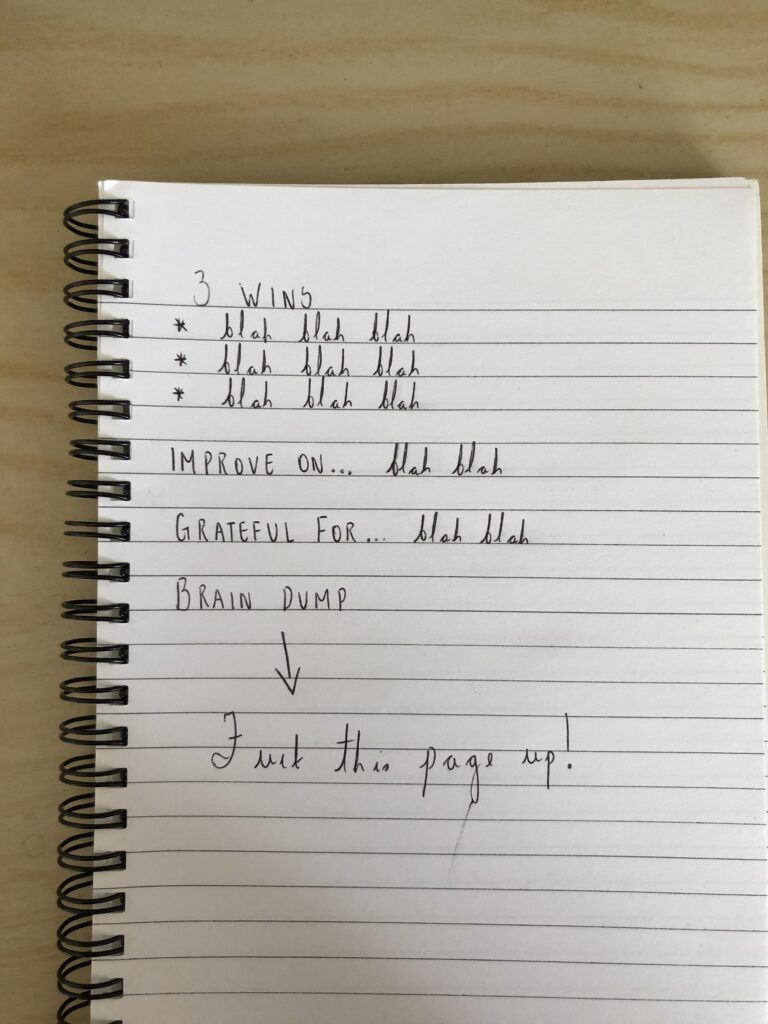
Most of us go through life in an abnormally chronic state of low-grade panic. Not severe enough to be labelled as clinical anxiety, but uncomfortable and ever-present enough to create a feeling of general fatigue and unease that colours our daily living.
Left unchecked, this barely-perceptible background noise of mental dis-ease will drive addictive behaviour1, 2 in all its forms; think of the last time you stress-ate. Or self-medicated with drugs (alcohol included). Or overworked yourself to the point of burnout. In each of these instances, a strong (and perhaps unconscious) motivator for your actions was your withdrawal from the noxious feeling of angst. Angst that would go away if you simply took the time to sit, reflect, and write in silence.
When we fail to investigate the backdrop of emotional unease, we end up living in a perpetually stressed state, and this sets us up for chronic illness3, 4, 5. Joint pain, gastrointestinal distress, anxiety and depression, and really any disorder where the root cause is systemic inflammation and sympathetic overdrive are likely to manifest if we fail to address the mysterious, existential discomfort that we’ve learned to live with (although if you’re always in pain, on edge, and easily fatigued, I’d hesitate to call that living).

Luckily there’s a solution. It’s dirt cheap, and only takes a few minutes out of your day. You ready?
To feel healthier and perform better in every aspect of your life, all you have to do is…
Make a habit of writing about your thoughts and feelings. Journaling, I’ve heard some people call it.
Does it take effort? Yes, but living with unaddressed anxiety and generalized fatigue takes more effort.
Is it corny? You bet, but it’s cheaper than therapy and works better than drugs.
Is it difficult to implement? It can be if you’re not sure what you’re doing, but if you keep reading this blog post, I’ll teach you. So without further adieu, here’s how to journal effectively so that you can feel sustainably good, from the inside out.

The quick and easy evening journal template, with prompts:
- POSITIVE REINFORCEMENT. If you’re like me, you’re probably brutal to yourself. The self-loathing is exhausting. Making time to give yourself mental pats on the back helps… a lot. Remember the W’s of the day and give yourself credit where credit is due.
- HONEST SELF-REFLECTION. Remember how you faltered and commit to being better about it tomorrow. (Bonus tip: The next morning, before you start your day, take a brief look at what you wrote down – boom, there’s your intention for the day!)
- GRATITUDE. Find the beauty in life, notice the awesomeness in simplicity, and leave the comparison/FOMO game behind. Make sure to zoom in and zoom out. As examples: to give thanks for the funny mannerisms of a close friend (zooming in), and to appreciate the magical mystery of existence itself (zooming out)
- BRAIN DUMP. Be the third-person observer of your thoughts and feelings. In order to move forward, you have to recognize, accept, investigate, and be kind to the shitty memories that play on repeat in your subconscious. Or the self-loathing thought patterns that motivate all your self-destructive behaviours and put a depressing Sepia-esque shade of grey over events in your life that are objectively joyous. (Bonus benefit: Insomnia sucks, and is oftentimes caused by a runaway brain. Dump out the contents of your brain. Get a deep sleep. Wake up feeling amazing.)

Follow that template for 30 consecutive night-time journaling sessions and you will notice drastic, positive changes come into your life. Now, what I just described was a specific technique that you should use for a good journal sesh. But the conversation wouldn’t be complete if I didn’t zoom out and mention key principles that you should remember to get the most out of your long-term journaling experience…
Key principles for effective journaling:
- TRUST IN THE PROCESS. And if needed, mentally reframe journaling so that it doesn’t suck. You can read my article on how to make journaling not suck, right here.
- BE CONSISTENT. Ask any dentist and she’ll tell you that brushing your teeth for two minutes, twice a day is more effective (and easier to comply with) than brushing for two hours, once a month. Ask any strength coach, and he’ll tell you that a program of daily submaximal lifting, or greasing the groove, will get you much stronger and is much, much safer than an ephedrine-fueled supramaximal lifting sesh once a week. Journaling is exactly the same. Consistency is king if you want your mind to feel powerful and be clear of plaque.
- BE UNASHAMEDLY HONEST – and I mean that in the purest sense of the word. Do not feel ashamed for what comes to your mind when you journal. Write it the fuck down. Remember that it’s your journal. It’s a tool to help you coach yourself towards better awareness, healthier habits, and a happier existence. It’s you being your own therapist; consoling yourself for the bullshit actions of the past and nurturing yourself towards the righteously impossible goal of self-actualization. It’s not for public consumption. So go ahead. Be unashamedly honest.
To recap: Stop living in a state of chronic low-grade stress. Start journaling. Because a 500-lb deadlift won’t take away the background noise of unease. And neither will running an ultra-marathon. You’ve got to get to the root cause of your angst in order to feel good from the inside out. So go. Right now, go. Find yourself a pen and paper, sit your ass down, and start writing. You’ll feel better because of it. I promise.
Pat Koo
BKin, CSCS
Further reading:
- Van der Kolk, B. (2015). The body keeps the score: Brain, mind, and body in the healing of trauma. Penguin.
- Maté, Gabor. (2008). In the realm of hungry ghosts: Close encounters with addiction. Knopf Canada.
- Selye, H. (1976). Stress in health and disease. Reading, MA: Butterworths.
- Sapolsky, R. M. (1994). Why zebras don’t get ulcers: A guide to stress, stress related diseases, and coping. W.H. Freeman.
- Maté, G. (2003). When the body says no: The cost of hidden stress. Toronto: A.A. Knopf Canada.




Pingback: Unstiffen Yourself (Part 1) - PK Health and Performance